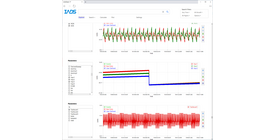
Modern flight test programs generate huge amounts of data that require interrogation to investigate phenomena and ascertain program status as well as for use in final reporting.
Traditionally, custom tools are developed for each flight test program to perform data search, analysis, and report generation. However, these custom tools are typically limited. They often contain little or no search capabilities, have no access to flight metadata or the ability to browse the data in an ad-hoc manner, they can often take hours (or days in a worst-case scenario) to retrieve requested data, and they usually have poor reporting features. Time constraints and development costs often narrow the development focus to a single program, which results in subsequent projects rarely reusing pre-existing post-test tools. These factors lead to new projects being forced to wastefully repeat the process of building their tool systems, which costs additional time, money, and human resources.
Recognizing the need for a unified platform for post-test analysis, Curtiss-Wright Defense Solutions released IADS Post Test Explorer (IPTE) in 2021. IPTE was developed in collaboration with the flight test industry to satisfy core requirements.
The ultimate goal was to create a standardized system for post-test analysis based on those requirements that could be used (and reused) by different flight test disciplines across different projects.
Since its release, we have received valuable feedback based on its use in the field. This input has provided insight into some of the obstacles and challenges encountered using such a system in a real-world environment and solutions that users have developed to overcome these obstacles. It has also highlighted various ways for us to evolve and improve IPTE. Examples of the feedback we’ve received includes strategies for fast and efficient data visualization of entire flights, the importance of a common API for different data types, and how to manage large amounts of data in a cloud environment. The next generation of IPTE will reflect these insights. What follows is an overview of what we’ve learned so far.
Log in to download the White Paper.

